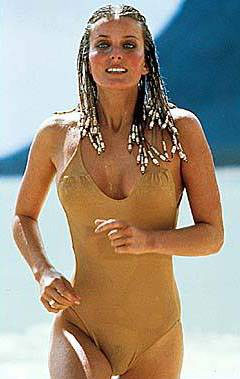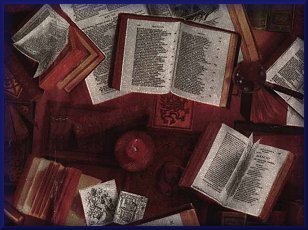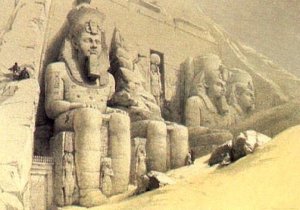Romance. We all love it, even those of us that suggest otherwise. Sex. Ditto there, folks. But is there any deeper quagmire that a writer can sink in? I'm talking about experienced authors as well as first time writers. It's a morass. How do you write about sex and romance, either together or separately, without coming off like something from
Penthouse magazine or worse just plan repetitive, dull, or clichéd? The topic is so sticky with cliché and innuendo that often people don't even recognize when something is clichéd. They're programmed to either go 'ahhhhhh' or blush, or sneer, or mock, or even giggle inanely.
For a writer, if we are writing some pure romance, or want to create a great sex scene that warms the... heart then we certainly don't want to cause our readers to put the scene down with a humph, a yawn, or a ridiculing laugh. If that scene is part of a greater whole than we sure don't want our readers to rush through uncomfortably, knowing that they won't miss anything of great import. Sex, like any other human activity, needs a reason to be in the story. If you're writing a romantic novel where boy meets girl, or girl meets girl, the sex is part and parcel of the narrative. No need to agonize whether or not to include it. The only question that needs to be in your mind is "how spicy, how explicit". In this case that judgment call is more about your audience. Some readers like their sex soft, romantic, vanilla, and veiled in pretty words, and that's just fine for that kind of novel. This blog isn't about that kind of writing.
Sex, just like romance, can be rude, quirky, dirty, sloppy, hurried, insane, intense, funny, and clumsy - and it happens for a reason. In our fiction writing it happens to reveal something about the character, or lead the characters where they need to go. These are all elements that once included make the reader associate more intensely with your characters and not reject the sex as gratuitous fluff. When it comes to awkward moments we've all been there and done that - and good sex is like good wine: it can combine flavors that seem madly disparate like blackberries and charcoal. The trick is knowing what is sexy and what is not out of those elements. If you're looking to turn up the heat you can be inventive and silly, but you have to know when any particular element is gross or makes your hero look like an unattractive ass. My trick is to imagine the scene completely: would I be turned on or off if a particular thing happened during sex?
Falling off the bed during the intensity of love-making can either be funny, tragic, or sexy. It will depend on the telling. Accidentally farting will always end the heat, even if the laughter kicks in (in real life you might get over it, but I can practically guarantee your reader won't). It's like overflowing trash in your kitchen when you're cooking. It spoils the appetite. It's important to keep it real, and yet, for the heat, you have to keep it from getting too real. It's always got to be a little bit of the best sex you ever had, and not necessarily just the best sex you ever imagined.
Truly great love affairs are never easy. They're not about candy,
Hallmark greeting cards, soft focus, or soft love-making from incredibly virile men with a sardonic smirk and a searing kiss, who knows when the heroine (who is unbelievably lovely, spunky but submissive in bed) says "no, no" she means "yes, yes". Truly great sex is often memorable for the details. Where you were, what you were doing before hand, how you felt at the time, and that warm laugh you shared when you broke your coffee mug as you swept it off your desk in the heat of passion. It's that wonderful little bit in
When Harry Met Sally when she fakes an orgasm in the deli, or
Bridget Jones's Diary where Hugh Grant strips off the cute little cocktail dress only to find granny panties. Or it's that bit that makes you want to crawl out of your skin in
The Age of Innocence where the passion of the main characters, so repressed by the societal mores of their day, is entirely expressed by Newland Archer removing the glove from Ellen Olenska's hand during a carriage ride and pressing her fingers to his lips.
So let's talk language for a second. I'm a fan of no beating around the proverbial bush. I find words like 'member', 'tool', and other such euphemisms amusing so they spoil the moment for me. Those that don't like their sex written so explicitly will, violently on occasion, disagree with me. If you have to use euphemisms be cautious with them, and choose the words with great care so that you're not accidentally inspiring laughter instead of sympathetic passion. You might be sparing your less sensitive readers much blushing but instead causing your more bold readers to laughter or worse, to feel boredom. Telling a sexy story need very rarely ever go right to the finish either. This is not porn we're talking about. The 'money shot' is seldom really called for in any scene. An orgasm is only an orgasm in real life. In fiction it's the lead up that counts. Make me squirm and shudder. Take me to the brink and I'll fall over the edge all by myself with the aid of my own imaginative juices.
 The human mind is an amazing instrument capable of processing data from multiple inputs at speeds that make the fastest microprocessor look like a slow moving cement mixer. Not only that but many of the functions it performs are sorted and prioritized without the owner even seeing or sensing the processes involved. One of the astonishing abilities of the mind is the interpretation and creation of symbols: one thing standing for another thing. Letters form words that the brain then interprets. A picture of shape that is roundish, red, and has a sticklike appendage near the top becomes an apple. I catch sight of a piece of leaf with just the stem and a small part of the base and I see a tadpole swimming on my carpet.
The human mind is an amazing instrument capable of processing data from multiple inputs at speeds that make the fastest microprocessor look like a slow moving cement mixer. Not only that but many of the functions it performs are sorted and prioritized without the owner even seeing or sensing the processes involved. One of the astonishing abilities of the mind is the interpretation and creation of symbols: one thing standing for another thing. Letters form words that the brain then interprets. A picture of shape that is roundish, red, and has a sticklike appendage near the top becomes an apple. I catch sight of a piece of leaf with just the stem and a small part of the base and I see a tadpole swimming on my carpet. 








 Birthday Book. The title needs a little explaining. Pan Historia is a community for collaborative and role-play writing, as well as history buffs, and a place for people with a whimsical or literary sense of fun to hang out and make friends. It's like a non-stop costume party (which is why October is such a popular month with our members and writers). We first went live around May 2000 and were in beta forever (it seemed at the time) due to a some what rocky start and no capital investment. Our first collection of work by our writers and artists was prepared and published in time for our 3rd Panniversary (yes, we do awful plays on words at Pan) - which is held every February because our official launch date was Valentine's Day, 2001. I think. Record keeping is not my strong suit. I forget my own name sometimes as well.
Birthday Book. The title needs a little explaining. Pan Historia is a community for collaborative and role-play writing, as well as history buffs, and a place for people with a whimsical or literary sense of fun to hang out and make friends. It's like a non-stop costume party (which is why October is such a popular month with our members and writers). We first went live around May 2000 and were in beta forever (it seemed at the time) due to a some what rocky start and no capital investment. Our first collection of work by our writers and artists was prepared and published in time for our 3rd Panniversary (yes, we do awful plays on words at Pan) - which is held every February because our official launch date was Valentine's Day, 2001. I think. Record keeping is not my strong suit. I forget my own name sometimes as well.
 I hate slugs; even their name is repellent. They're slimy little squishy eating machines: gross miniature monsters eating holes in the beautiful leaves of my imagined perfect garden. Though I hate to touch them I had no qualms about crushing them under the heel of my boot to rid the garden of their pestilence. A few minutes later I came across the common garden snail (escargot to you) and my reaction was quite different. It's still a garden pest and eating machine but instead of active repugnance I pick it carefully up by its stripped tortoiseshell-like spiral home where it brings a smile to my face as it starts to uncurl its little noble head from its body to peer at me inquisitively from its extraordinary eyestalks.
I hate slugs; even their name is repellent. They're slimy little squishy eating machines: gross miniature monsters eating holes in the beautiful leaves of my imagined perfect garden. Though I hate to touch them I had no qualms about crushing them under the heel of my boot to rid the garden of their pestilence. A few minutes later I came across the common garden snail (escargot to you) and my reaction was quite different. It's still a garden pest and eating machine but instead of active repugnance I pick it carefully up by its stripped tortoiseshell-like spiral home where it brings a smile to my face as it starts to uncurl its little noble head from its body to peer at me inquisitively from its extraordinary eyestalks. I couldn't crush it: I carefully carried it out of the garden. I never have been able to harm a snail. They're slippery, not slimy. They have beautiful shells. They have an elegance when fully extended, a sort of equine grace to their heads and the arch of their body as they navigate their world with a slow steady curiosity. I'm sure many of these are imagined qualities in my head, but my love affair with snails has been going since I was a kid when I would collect them to keep as pets, and carefully release them before I had them too long.
I couldn't crush it: I carefully carried it out of the garden. I never have been able to harm a snail. They're slippery, not slimy. They have beautiful shells. They have an elegance when fully extended, a sort of equine grace to their heads and the arch of their body as they navigate their world with a slow steady curiosity. I'm sure many of these are imagined qualities in my head, but my love affair with snails has been going since I was a kid when I would collect them to keep as pets, and carefully release them before I had them too long. The irony of all of this is that slugs, to most people, are snails without shells. In the mind of most people they are quite similar, if not nearly exactly the same, and the slime of the slug is the slime of the snail. Each has the same disastrous effect in the garden as they munch their way across your favorite shrub, veggies, and flowers. Even biology bears out the opinions of most people: they are both gastropods that got out of the sea and crawled on the land. Slugs developed mucus to protect their soft bodies designed for aquatic living and snails have a shell, like many of their relatives. Sea slugs are some of the most beautiful creatures on earth, nudibranchs, and even some land slug species are quite extraordinary.
The irony of all of this is that slugs, to most people, are snails without shells. In the mind of most people they are quite similar, if not nearly exactly the same, and the slime of the slug is the slime of the snail. Each has the same disastrous effect in the garden as they munch their way across your favorite shrub, veggies, and flowers. Even biology bears out the opinions of most people: they are both gastropods that got out of the sea and crawled on the land. Slugs developed mucus to protect their soft bodies designed for aquatic living and snails have a shell, like many of their relatives. Sea slugs are some of the most beautiful creatures on earth, nudibranchs, and even some land slug species are quite extraordinary. I went grocery shopping last night after work. Exhausted though I was we were completely out of food and I'd gone to work in the morning with a stale croissant from Safeway and Starbucks (possibly the worst supermarket and worst coffee franchise ever) so I was resolute in my desire to fill a shopping cart with a basket of good food from a different food chain. Taking my time I was drawn to the magazine rack as I strolled by leaning heavily on the handle of the cart. People Magazine had put out one of its glossy special editions "
I went grocery shopping last night after work. Exhausted though I was we were completely out of food and I'd gone to work in the morning with a stale croissant from Safeway and Starbucks (possibly the worst supermarket and worst coffee franchise ever) so I was resolute in my desire to fill a shopping cart with a basket of good food from a different food chain. Taking my time I was drawn to the magazine rack as I strolled by leaning heavily on the handle of the cart. People Magazine had put out one of its glossy special editions " Plans are moving ahead for the re-launch of the Pan Press as a division of a small publishing house. We had our first business meeting to discussion the structure of the operation. We have a couple designers ready and primed. My idea is to start with some of the best of the best of
Plans are moving ahead for the re-launch of the Pan Press as a division of a small publishing house. We had our first business meeting to discussion the structure of the operation. We have a couple designers ready and primed. My idea is to start with some of the best of the best of  I received a copy of a trade magazine in the mail that I used to write a regular feature for as part of my last job. My feature was also always the cover story. The new issue included the latest of these regular features, now, of course, written by my successor. To read the magazine presents a seamless tradition. There was and is no byline on this feature. To the casual observer there has been no change at all. Life goes on within and without me. Holding a copy of this magazine in my hand led to some bittersweet reflection about the footprint that we leave in life.
I received a copy of a trade magazine in the mail that I used to write a regular feature for as part of my last job. My feature was also always the cover story. The new issue included the latest of these regular features, now, of course, written by my successor. To read the magazine presents a seamless tradition. There was and is no byline on this feature. To the casual observer there has been no change at all. Life goes on within and without me. Holding a copy of this magazine in my hand led to some bittersweet reflection about the footprint that we leave in life.
